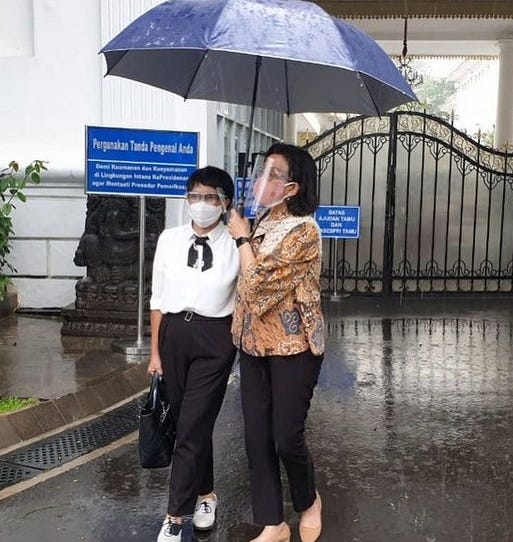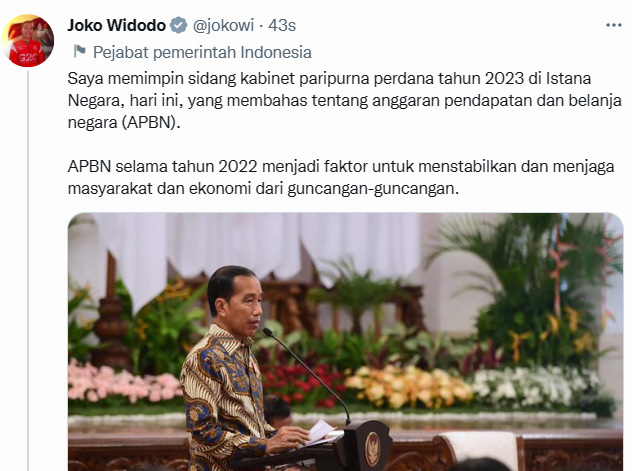Under Guided Sri Mulyani and Retno Marsudi: Indonesia’s Economic and Foreign Affairs Policy 2023
As Budget 2023 approaches, calls to streamline the capital-gains-tax rules across the rich, equity, debt, real estate, and mutual funds, are getting louder. The Harmonized Tax Law passed last year stipulates that VAT be raised to 11 percent this year and 12 percent three years later, from 10 percent presently. The law also raises income taxes on the rich, scraps a proposal to cut corporate income taxes and introduces carbon taxes, among other measures. Sri Mulyani said the government needed to reform its tax policy to achieve fiscal consolidation plans. She gave an assurance that the government would, through social aid programs, shield low-income groups from the effects of the hike.
Different holding periods, tax rates, indexation rules, tax breaks, etc., make it complex and challenging—even for experts. Questions have been raised by many over what the economic prospects of 2023 look like. This is logical after the Indonesian economy grew strongly in 2022, when other countries hammered, especially because the hike prices of energy in the wake of the Russia - Ukraine war (Jan 12 2023 = Day 323 of war).
Global growth is slowing "perilously close" to recession, the World Bank said Tuesday (Jan 10th), slashing its 2023 economic forecast on high inflation, rising interest rates and Russia's invasion of Ukraine. Economists have warned of a slump in the world economy as countries battle soaring costs and central banks simultaneously hiked interest rates to cool demand -- worsening financial conditions amid ongoing disruptions from the war in Ukraine.
The World Bank's latest forecast points to a "sharp, long-lasting slowdown" with growth pegged at 1.7 percent this year, roughly half the pace it predicted in June, said the bank's latest Global Economic Prospects report. This is among the weakest rates seen in nearly three decades, overshadowed only by the pandemic-induced downturn of 2020 and global financial crisis in 2009. Modest loan growth is projected for Indonesia in 2023 in contrast to last year’s surge in credit growth, as lenders and borrowers are likely to face tougher conditions stemming from looming global and local uncertainties.
The Indonesian government has indicated it would welcome cheaper crude to alleviate pressure on the state budget. Finance Minister Sri Mulyani Indrawati explained that, if the price cap were implemented and proved to be effective, the resulting lower global oil prices could benefit Indonesia. The government is in no hurry to spend unused funds (SILPA, Sisa Lebih Pembiayaan Anggaran) budgeted, planning instead to use them to beef up the state treasury and thus reduce its reliance on debt financing next year, as borrowing gets more costly amid soaring interest rates and heightened uncertainty. The government was deliberately saving up some unused budget funds to be carried over to 2023, which would reflect in a high SILPA account at the end of this year. But potential spending aggressively is still looming this year. After becoming Chairmanship G20 last year, in 2023 Indonesia became ASEAN Chairmanship.
Amid the gloomy forecast for 2023, reinforcing ASEAN’s resilience, both politically and economically, will top Indonesia’s priorities, Foreign Minister Retno Lestari Priansari Marsudi said in her annual foreign policy speech on Wednesday (Jan 11). Marsudi talked in detail about the country’s diplomatic achievements in 2022 and her top priorities as President Joko “Jokowi” Widodo’s chief diplomat this year as the country assumes the rotary ASEAN chairmanship. Retno maintained that the country had excelled on at least five diplomatic fronts last year: the maintenance of national sovereignty, the protection of its citizens, economic diplomacy, public health and contributions to regional and world peace. This year, the ministry has set four targets: diplomatic progress on questions of sovereignty, including land and sea borders; citizen protection; economic cooperation; and active participation in peace and humanitarian diplomacy.
In the G20 last year as Indonesia to be Chairmanship, reaching consensus could be catastrophic for low-income countries amid soaring food and energy prices exacerbated by the war in Ukraine. Sri Mulyani said Indonesia would be an honest broker and find creative solutions to overcome the "triple threat" of surging commodity prices, global inflation and war.
On tax, a differential in rules leads to unequal incentives—which leads to investors putting money in asset classes with tax advantages rather than on its merit. But changes in budget will have to deal with strong lobbies from both sides—those who seek incentives and those who resist change. Sri Mulyani Indrawati has defended an upcoming controversial tax bill as a must to keep the state budget sustainable and to create a just taxation system. She said the bill would achieve the two goals by, among other things, introducing higher income taxes on wealthy citizens, tiered value-added tax (VAT) rates, a second tax amnesty and carbon taxes on high-emission goods and services. “This is how we continuously reform tax policies and bureaucracy to reflect the principles of justice, inter-sectoral justice between income groups, and to create legal certainty,” Sri Mulyani explained.
More than Rp 594 trillion (almost US$40 billion) in hidden assets has surfaced during the second tax amnesty, or so-called voluntary disclosure program, and will now be subject to Indonesia taxes. The six-month program that ended last July has yielded more than Rp 61 trillion extra revenue from the newly declared assets. Taxpayers participating in the program have been given until Sept. 30, 2023 to finish repatriating their assets. They must also invest them in government bonds or selected domestic projects, such as renewables and commodity processing industries, for a minimum of five years.






